Today has been a very hard day.
Since I awoke from yet another violent nightmare this morning, I've been overwhelmed by mental images and thoughts of violence, especially State-sanctioned violence.
Two days ago, the partner of a close friend was hit in the head by a high-velocity teargas canister fired into a group of non-violent protesters in the West Bank. He is still alive, but in critical condition and no one knows when or even if he will recover.
Seeing the photos of him on the ground, covered in blood, brought back a flood of memories.
Images of my friend Brad Will, gunned down in 2006 by government paramilitary thugs in Mexico, push themselves into the front of my mind. The sound of his voice when he was shot, recorded by the video camera he was holding at the time, echoes in my brain.
I also keep thinking about the hundreds, if not thousands, of nameless and faceless victims of similar violence.
I know that the attention that Tristan and Brad have gotten is because they are white American activists. Their skin privilege makes them stand out in a sea of darker skinned victims.
It is not fair, but if we can shine a light of attention on the larger issues; if we can get the mainstream public to pay attention because these victims look and talk like they do, it is necessary to do so.
If what happened to them can make the other victims less anonymous and ignored, maybe their sacrifices are not in vain.
I know that there are tens of thousands of people dying in Darfur, in the Middle East, in Oaxaca, and other small ignored corners around the globe.
Why should the lives of these few people be worth more?
The quick answer is that, of course, their lives are not worth more. However, the sad reality is that because of how our world is, it seems to take the mutilation or death of someone white and from the west to get people to put aside their complacency and think about what is going on; what is being done in our names and with our tax money.
Today is especially hard for me because it is the anniversary of one of the darkest moments of my life. 21 years ago this evening, I almost became one of those martyrs.
After calling the police to deal with the theft of my roommate's bicycle, due to the arrogance and hate of one police officer, I was badly beaten -- first in a public parking lot by 3 officers and then again in the witness-free zone of the strip-search room of Central Booking in downtown Buffalo. The only thing that saved my life that night, other than the fast action of my friends, was the color of my skin.
In fact, the cop that was the ringleader of those that attacked me told me directly that it was my skin that kept him from killing me in the parking lot. "You should shut up about police brutality, let me tell you son, if you were a nigger you'd be going right to the hospital instead of downtown"
A half hour later, when he started beating me while I was being strip searched, I was sure that he had decided that white skin privilege was not enough to keep him from killing me. I was sure then and am still sure now that he wanted to kill me, and for it to be a long and painful death.
I'm not sure what happened. Maybe he got bored, maybe one of the other cops made a comment or gesture that made him think twice about it, maybe he just wanted to take a break and continue after some coffee. After he stopped beating the crap out of me, I was put in a holding cell. It was the middle of a very cold Buffalo winter, and the cell I was put in had all the windows open.
Covered in blood, the spit of numerous police officers, and completely naked, I sat there trying to stay warm and awake -- sure that if I were to fall asleep I would freeze to death by morning and it would simply be chalked up as a crazy accident. Maybe they'll try to make it look like a suicide, I thought as I did my best to keep moving and alert.
My vision was blurred by a combination of factors, they had confiscated my glasses and I had sustained a concussion as my head was slammed into a brick wall by the force of the cop's blows.
All I knew was that I was being held on a high bail, I had no idea what I was being charged with. Later I would find out that I was accused of attacking a cop, as well as numerous other false charges.
I was informed that I would be held for the maximum time they could before bringing me in front of a judge. I could only wonder how many other beatings I would be subject to before I got to see a judge.
I knew that I was hurt badly and was not sure how much more I could sustain before my body gave in, or forced me to fall asleep in the sub-zero temperatures. I was comforted by the thought that from what I had read, freezing to death is a relatively painless way to die.
What I did not know at the time was that because they had officially filed charges against me, it was possible for me to be bailed out before I saw a judge. They put a dollar amount on every charge, add them up and arrive at the amount of money (cash only) that is necessary.
As far as they figured, no one knew I was under arrest -- I was never given the chance to make a phone call. If you think that after arrest you are guaranteed a phone call and that someone reads you your rights, you've been watching too much TV. You only hear your rights if they intend to question you and want to be able to use what you say in court. If they think you'll never survive to make it to court, or if they don't care about using your statements in court, they don't waste their time.
They assessed my situation and acted accordingly. They could do what they wanted, kill me if they cared to and I would be simply another faceless and nameless victim of the System.
Luckily for me, they did not realize that one of the witnesses to my arrest and beating was one of my roommates. Their prejudice would not allow them to contemplate the possibility that a grubby hippy could have friends that could quickly organize a bail fund.
5 hours after being thrown into the jail cell, the cage door opened. When the 3 cops walked in, I knew I was about to die. This was it.
When they handed me my clothes and ordered me to get dressed, I was really confused. Where were they taking me? Why won't they just let me freeze to death? What new torture and pain did they have planned? I was fully prepared to die.
"You've been bailed out, hurry up before I change my mind, your friends are waiting for you downstairs." the highest ranking among the cops said.
My friends and professors had emptied their bank accounts, taken cash advances on their credit cards, pooled together whatever spare change they had lying around. Some of them went to the precinct and demanded I be released. They were determined to not leave without me. They had come to take me home (although I required a trip to the hospital first).
I walked as fast as my bruised bones could carry me, still confused and certain that this was a trick. Get my hopes up and then beat me down again -- I was sure this was the plan.
When I was led to the waiting area and saw two friends, Steve and Diana, waiting for me it did not seem real. It was not until I made physical contact with them, limping out of Central Booking with my arms over their shoulders, that I realized it was over, that I had survived.
We went to the hospital, and then home. The feeling of relief that flooded me when I sat down and Diana made me a cup of tea also has stayed with me. It's amazing how powerful such a small act can be, I still refer to Lipton blackberry flavored black tea as "Freedom Tea" and whenever I get really stressed out I make myself a cup.
I will never forget all sides of that night -- the certainty of death; the violence of the State; the power of community; the love of friends.
When my case came to trial, I was forced to take a really crappy deal.
They were going to convict me of at least one count of disorderly conduct if not more. I had after all, as I was charged with, "shouted an obscenity in a public place in a way that made others feel uncomfortable." The fact that the obscenity was used in the sentence "Why the fuck are you hitting me!" would not keep me from being convicted.
In order to keep my record clear of convictions, I had to sign away my rights to sue the City of Buffalo for brutality and false arrest. Nothing would ever happen to the cops that tried to kill me. There would never be any justice.
This is hard for me to say, but in many ways, I have never fully recovered. It was only a couple of years ago that I finally came to the realization of just how much that one night had impacted my life.
I still struggle every day to move beyond that space in my head; to get away from the feeling that death is waiting for me around every corner; to find myself amidst the emotional rubble.
Each day is a struggle, but each day is a victory. I survived. The reality that white skin privilege allowed me to walk out where so many others had been carried out in caskets has gnawed at my soul.
The guilt, the anger, the shame, the rage have all stayed with me. I work every day to move past it.
Someday, I'll be free.

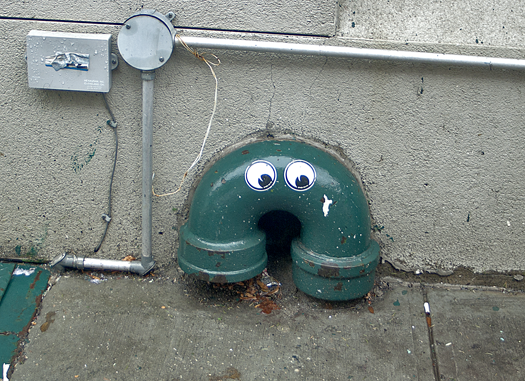
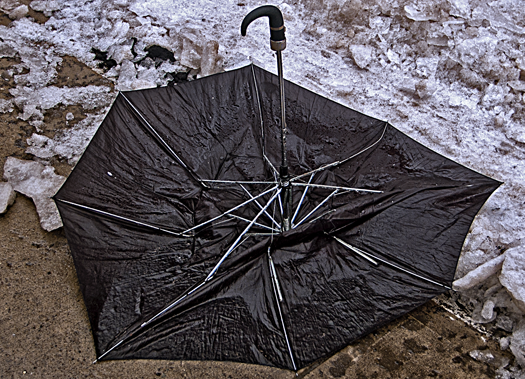
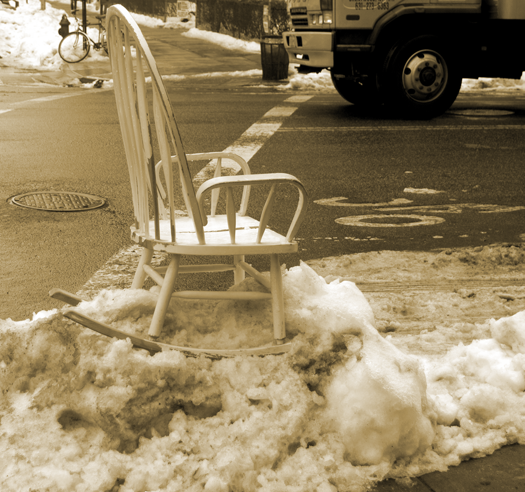
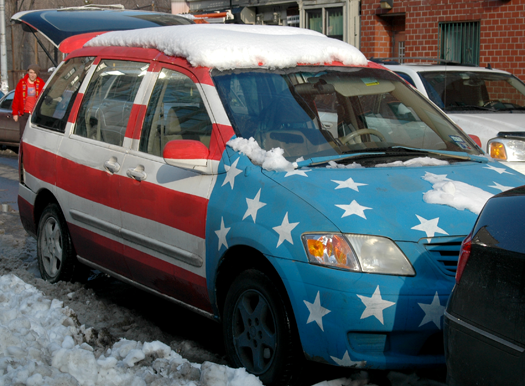
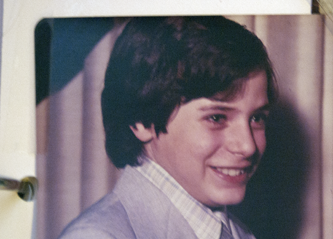 My Bar Mitzvah was scheduled for April 7th 1979. Some of my relatives would have to travel past the troubled Pennsylvania reactor. There was talk of them having to cancel the trip. As the crisis escalated, there was even some talk of having to cancel the event altogether. No one really knew what would happen if they did not get the reactor under control.
My Bar Mitzvah was scheduled for April 7th 1979. Some of my relatives would have to travel past the troubled Pennsylvania reactor. There was talk of them having to cancel the trip. As the crisis escalated, there was even some talk of having to cancel the event altogether. No one really knew what would happen if they did not get the reactor under control.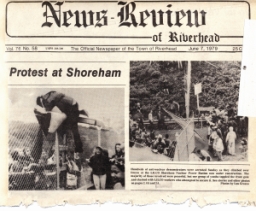 An hour later, the rain had let up a bit and I was in the middle of a 15,000 person crowd. I listened to some folks talk about how important it was to prevent the completion of the plant; I heard Pete Seeger play for the first time. The energy was amazing. I shouted and chanted along with the crowd. I felt I was participating in history.
An hour later, the rain had let up a bit and I was in the middle of a 15,000 person crowd. I listened to some folks talk about how important it was to prevent the completion of the plant; I heard Pete Seeger play for the first time. The energy was amazing. I shouted and chanted along with the crowd. I felt I was participating in history. When we got off the bus, the reality hit me. I was actually under arrest. They explained to the group that as long as we gave them our names, we would be given a summons and let go. If we refused to give our names, they would hold us on additional charges.
When we got off the bus, the reality hit me. I was actually under arrest. They explained to the group that as long as we gave them our names, we would be given a summons and let go. If we refused to give our names, they would hold us on additional charges. 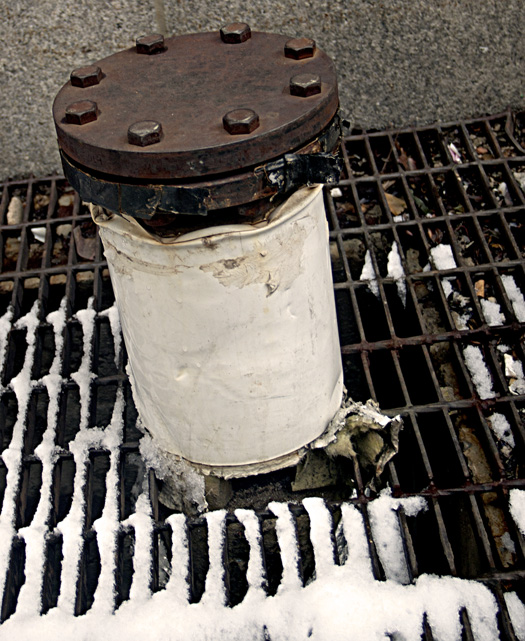
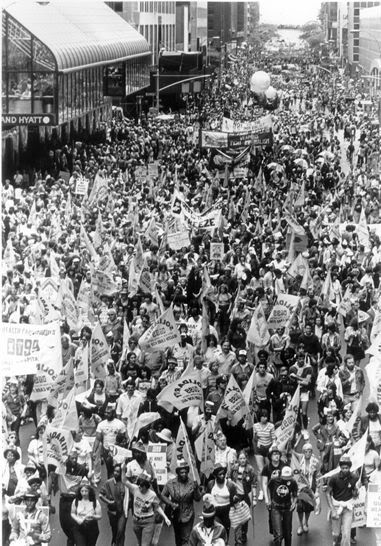 We started off much farther back in the crowd than we expected and tried our best to move faster than the group looking for the NFTY delegation (national federation of temple youth, the reform Jewish youth umbrella organization).
We started off much farther back in the crowd than we expected and tried our best to move faster than the group looking for the NFTY delegation (national federation of temple youth, the reform Jewish youth umbrella organization).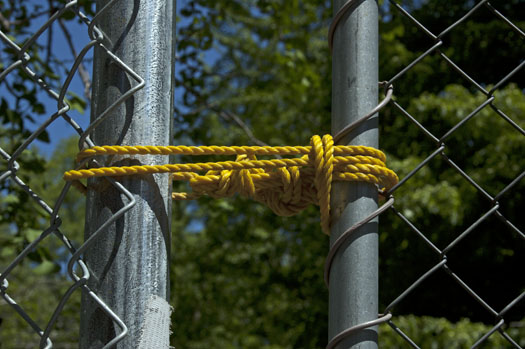

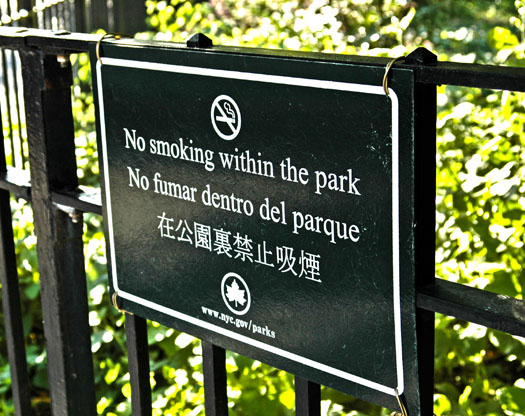
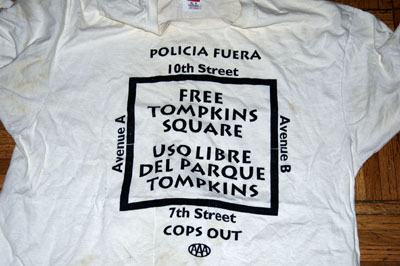 The park had to be "cleaned up" and closed at night. The bandshell needed to disappear. The City still had a bit of a black eye in terms of how the public viewed the situation around the park. The revelations that followed the '88 Police Riot still lingered in public memory.
The park had to be "cleaned up" and closed at night. The bandshell needed to disappear. The City still had a bit of a black eye in terms of how the public viewed the situation around the park. The revelations that followed the '88 Police Riot still lingered in public memory.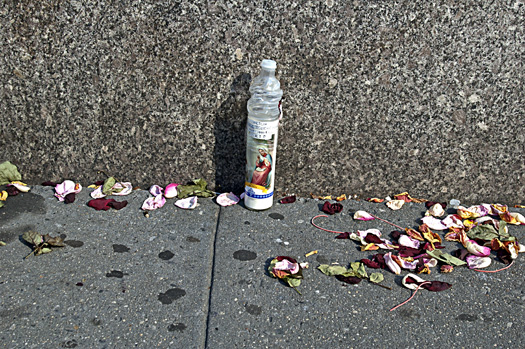 Back before we all had cell phones, it was not as easy to keep in touch or get info to a friend. This was especially true if your friends moved frequently or lived in squats.
Back before we all had cell phones, it was not as easy to keep in touch or get info to a friend. This was especially true if your friends moved frequently or lived in squats.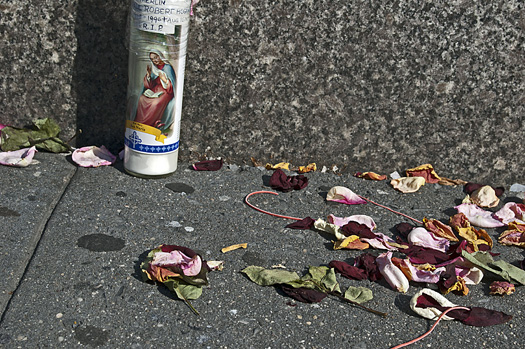 15 years ago this week, I walked by as he was being loaded into an ambulance. He had not looked healthy for a while. I ran into Blackout Books where some meeting was going on and gathered a crew to go back and gather his belongings off the sidewalk so when he got out of the hospital he'd still have his things.
15 years ago this week, I walked by as he was being loaded into an ambulance. He had not looked healthy for a while. I ran into Blackout Books where some meeting was going on and gathered a crew to go back and gather his belongings off the sidewalk so when he got out of the hospital he'd still have his things. July 1993. I'm on the bus travelling east. It's been a long time since I've been home. I can almost taste the bagels of my imagination and hear the clanking of the wheels of the subway in my mind. I got word last week that the case against the unknown John Doe had been dropped, the investigation ended, the trumped up charges erased.
July 1993. I'm on the bus travelling east. It's been a long time since I've been home. I can almost taste the bagels of my imagination and hear the clanking of the wheels of the subway in my mind. I got word last week that the case against the unknown John Doe had been dropped, the investigation ended, the trumped up charges erased. Everyone stops, it is super quiet for a moment. Everyone is shocked. Where there was a nice perfectly shaped front windshield a moment ago there's now a fractal pattern of chips held together by some unseen force, the middle layer of auto glass.
Everyone stops, it is super quiet for a moment. Everyone is shocked. Where there was a nice perfectly shaped front windshield a moment ago there's now a fractal pattern of chips held together by some unseen force, the middle layer of auto glass.

Thank you
Eric, you're amazing. I'm grateful to you for sharing such a powerful account of your experience. I'm glad you're still with us, continuing to struggle for freedom for yourself and for everyone.
thanks for that
Danny, thanks for the kind words. I'm very happy to have comrades like you in my life.
Peace
You know, (you probably do know, I suppose) you've never told me the whole story. Post-traumatic stress is real and really damaging. You don't recover from a beating like that easily, and the injustice of having to give up your right to any recourse is a lot of salt to pour on.
I used to think that hippies were a bunch of hippies and all this talk of "peace" was kind of BS, but I'm realizing more and more that countering violence is really hard work. We are a violent lot, humans. A nasty and violent lot when we want to be. Power only makes it worse. and there isn't some magic pill we can swallow to fix that. I find myself imagining that I am capable of understanding what makes people beat the living crap out of anyone else. I'm not.
not even close to the whole story
Amanda,
Yes, I know that many of my friends have never heard the full story. In fact, this post is not even close to the full story, but an attempt to finally start talking about it and looking at how it effected me and how I react to stressful situations at times.
One of the more comical moments that night happened as I was being brought into the precinct. The commanding officer came over, and seeing that I had obviously been roughed up, wanted to know what happened.
He looked at the arresting officer and asked him, "What did he do?" in a way that for a moment made me believe that he was concerned that I had been unreasonably treated.
The arresting officer looked at the commander and simply said "he was being an asshole."
The commander then looked down at me, and in a concerned fatherly tone asked me "were you being an asshole, son?"
As I started to babble about how I had just been beaten for no reason, that I had called the cops because of my roommate's bicycle being stolen, the arresting officer came up behind me and pulled on the handcuffs knocking me off balance. As I tried to catch my balance and not fall over, which required lifting one leg off the ground, the commanding officer cut me off mid sentence and accused me of trying to kick him and essentially gave the arresting pig the ok to do whatever he wanted to.
For a while, that line -- Were you being an asshole son? -- became a running joke between me and some friends. A fun way of suggesting that things totally out of your control were your fault.
"Man was the subway crowded today"
"well, were you being an asshole, son?
on the idea of privilege
Police Brutality was rampant in buffalo, especially in the African-American community. But one white boy being beat was news.
Some folks at the UB Law School even organized a debate on campus about the topic.
The cop in charge of investigating all claims of brutality was on the panel. Without any sense of doubt, he said to the audience that "all reports of police brutality are criminals trying to get a free ride" or something close to that.
At that moment, I lost my shit like I had never done before and ranted about the reality of what was happening at Central Booking. Why was there no camera to watch the police in the areas they most often are accused of abuse? Why was there no Civilian Complaints Review Board? Why were there no statistics released to the public? How often were people forced to sign away their rights?
I was mid-rant when this photo was taken. The next morning it was on the front page of the Buffalo News (the only daily newspaper in Buffalo).
I'm not all that proud of the image, but it clearly shows the rage that had been created by my experience
The full title of the article was "Police Brutality Prompts Spirited Debate on Campus
Police
Eric,
Holy shit, i have known you for how many years, and never even got close to the narrative you laid out. I thank you for the account, especially in the larger context of State violence. Since it happens (in our society) to such a relatively small subset of the population, it is easy to marginalize and trivialize. PTSD is the ticking bomb in our culture. Watch for more of it manifesting in random ways. My housemate is an x army ranger special forces, who spends a great amount of time watching war films, as a way of dealing with the things he did to the Sandinistas in the 80s. Interesting watching how he deals with the trauma, from the other end of the spectrum. If i digress, its because you can follow this thread anywhere, its so damn pervasive, and an undercurrent in our so called orderly society.
Take care----A
This horrific account of
This horrific account of police brutality is a story that needs to be heard. I cannot believe you were treated this way by the Buffalo Police Department. I wish you didn't take the plea bargain, and took those bastards to court.
--
Frank
Car accident lawyer